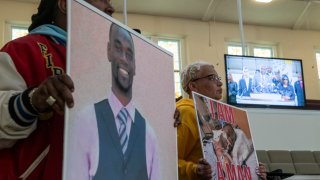
Documents released Tuesday provided a scathing account of what authorities called the “blatantly unprofessional” conduct of five officers involved in the fatal police beating of Tyre Nichols during a traffic stop last month — including new revelations about how one officer took and shared pictures of the bloodied victim.
The officer, Demetrius Haley, stood over Nichols as he lay critically injured from the beating and took photographs, which he sent to other officers and a female acquaintance, according to documents released by the Tennessee Peace Officers Standards and Training Commission.
“Your on-duty conduct was unjustly, blatantly unprofessional and unbecoming for a sworn public servant,” the Memphis Police Department wrote in requesting that Haley and the other officers be decertified.
Haley's lawyer declined to comment, and lawyers for the other four officers either declined to comment or did not respond to requests from The Associated Press.
The five officers — Haley, Desmond Mills Jr., Tadarrius Bean, Justin Smith and Emmitt Martin III — have all been fired and charged with second-degree murder. The new documents, signed by Memphis Police Chief Cerelyn “CJ" Davis, offer the most detailed account to date of each individual officer's actions during the incident. Davis signed each of the five requests to decertify the officers.
Get Tri-state area news delivered to your inbox.> Sign up for NBC New York's News Headlines newsletter.
Another officer has also been fired and a seventh has been relieved of duty. As many as 13 Memphis officers could end up being disciplined in connection with the violent arrest of Tyre Nichols, officials said Tuesday.
U.S. & World
The newly released documents are part of a request by the Memphis Police Department that the five officers who have been charged with murder be decertified and prohibited from working in law enforcement again.
Haley, who was driving an unmarked car and wore a black sweatshirt hoodie over his head, forced Nichols from his car using loud profanity, then sprayed him directly in the eyes with a chemical irritant spray, according to the statement.
“You never told the driver the purpose of the vehicle stop or that he was under arrest,” it states.
Haley did not have his body camera on when he stopped Nichols but was on a phone call with someone who overheard the encounter.
Nichols ran from the officers but was apprehended again a few blocks away. At that point, Haley kicked him in the torso as three other officers were handcuffing him. Other officers kicked Nichols in the face, punched him or struck him with a baton. According to footage captured on a utility pole camera, one of the officers appears to quickly take a photo of Nichols on his phone at the 7:55 minute mark as flashlights are shined on him.
“You and other officers were captured on body worn camera making multiple unprofessional comments, laughing, bragging about your involvement,” the decertification charges against Mills said.
The decertification charges against Mills noted, “You admitted you did not provide immediate medical aid and walked away and decontaminated yourself from chemical irritant spray.”
Martin claimed Nichols tried to grab the officer’s gun from his holster after another officer forced him out of the vehicle, the police chief wrote. Audio from a body camera did not capture Nichols using profanity or making violent threats. Martin, meanwhile, used disparagingly profane language as he commanded Nichols to put his arm behind his back.
On a required form, Martin claimed Nichols grabbed his duty weapon before the officers took him to the ground. However, video evidence doesn’t corroborate that, the police chief wrote. Martin later told investigators that the details were correct. Martin also failed to disclose that he punched Nichols in the face and kicked him multiple times in the form, and instead added in his later statement to investigators that he gave “body blows.”
Police deemed the oral and written statements as deceitful, the chief wrote.
Nichols died three days after the beating.



